Deck 6: Weather Systems
Question
Question
Question
Question
Question
Question
Question
Question
Question
Question
Question
Question
Question
Question
Question
Question
Question
Question
Question
Question
Question
Question
Question
Question
Question
Question
Question
Question
Question
Question
Question
Question
Question
Question
Question
Question
Question
Question
Question
Question
Question
Question
Question
Question
Question
Question
Question
Question
Question
Question
Question
Question
Question
Question
Question
Question
Question
Question
Question
Question
Question
Question
Question
Question
Question
Question
Question
Question
Question
Question
Question
Question
Question
Question
Question
Question
Question
Question
Question
Question

Unlock Deck
Sign up to unlock the cards in this deck!
Unlock Deck
Unlock Deck
1/130
Play
Full screen (f)
Deck 6: Weather Systems
1
Continental tropical air masses are:
A)cold and wet
B)cold and dry
C)warm and wet
D)warm and dry
A)cold and wet
B)cold and dry
C)warm and wet
D)warm and dry
D
2
Air masses move specifically in response to:
A)pressure gradients and insolation
B)insolation and surface winds
C)upper-level winds and pressure gradients
D)surface winds and insolation
A)pressure gradients and insolation
B)insolation and surface winds
C)upper-level winds and pressure gradients
D)surface winds and insolation
C
3
Which front is associated with widespread stratus cloud development?
A)warm
B)stationary
C)cold
D)moving
A)warm
B)stationary
C)cold
D)moving
A
4
Which type of front tends to cause the most rapid lifting?
A)stationary
B)occluded
C)warm
D)cold
A)stationary
B)occluded
C)warm
D)cold

Unlock Deck
Unlock for access to all 130 flashcards in this deck.
Unlock Deck
k this deck
5
Maritime tropical air masses are:
A)cold and wet
B)cold and dry
C)warm and wet
D)warm and dry
A)cold and wet
B)cold and dry
C)warm and wet
D)warm and dry

Unlock Deck
Unlock for access to all 130 flashcards in this deck.
Unlock Deck
k this deck
6
Which front tends to move most quickly?
A)warm
B)cold
C)occluded
D)stationary
A)warm
B)cold
C)occluded
D)stationary

Unlock Deck
Unlock for access to all 130 flashcards in this deck.
Unlock Deck
k this deck
7
Which type of front is most likely to generate cumulonimbus clouds and severe thunderstorms?
A)stationary
B)occluded
C)warm
D)cold
A)stationary
B)occluded
C)warm
D)cold

Unlock Deck
Unlock for access to all 130 flashcards in this deck.
Unlock Deck
k this deck
8
Which front involves a warm air mass lifted completely off the ground?
A)stationary
B)occluded
C)warm
D)cold
A)stationary
B)occluded
C)warm
D)cold

Unlock Deck
Unlock for access to all 130 flashcards in this deck.
Unlock Deck
k this deck
9
Continental polar air masses are:
A)cold and wet
B)cold and dry
C)warm and wet
D)warm and dry
A)cold and wet
B)cold and dry
C)warm and wet
D)warm and dry

Unlock Deck
Unlock for access to all 130 flashcards in this deck.
Unlock Deck
k this deck
10
Which of the following is not a type of cyclone?
A)hurricane
B)typhoon
C)tornado
D)monsoon
A)hurricane
B)typhoon
C)tornado
D)monsoon

Unlock Deck
Unlock for access to all 130 flashcards in this deck.
Unlock Deck
k this deck
11
Continental arctic air masses are:
A)cold and wet
B)cold and dry
C)warm and wet
D)warm and dry
A)cold and wet
B)cold and dry
C)warm and wet
D)warm and dry

Unlock Deck
Unlock for access to all 130 flashcards in this deck.
Unlock Deck
k this deck
12
Maritime polar air masses are:
A)cold and wet
B)cold and dry
C)warm and wet
D)warm and dry
A)cold and wet
B)cold and dry
C)warm and wet
D)warm and dry

Unlock Deck
Unlock for access to all 130 flashcards in this deck.
Unlock Deck
k this deck
13
Maritime equatorial air masses are:
A)cold and wet
B)cold and dry
C)warm and wet
D)warm and dry
A)cold and wet
B)cold and dry
C)warm and wet
D)warm and dry

Unlock Deck
Unlock for access to all 130 flashcards in this deck.
Unlock Deck
k this deck
14
An extensive body of air in which temperature and moisture characteristics are fairly uniform is a(n):
A)easterly wave
B)polar outbreak
C)jet stream
D)air mass
A)easterly wave
B)polar outbreak
C)jet stream
D)air mass

Unlock Deck
Unlock for access to all 130 flashcards in this deck.
Unlock Deck
k this deck
15
Which front has the steepest slope?
A)warm
B)cold
C)occluded
D)stationary
A)warm
B)cold
C)occluded
D)stationary

Unlock Deck
Unlock for access to all 130 flashcards in this deck.
Unlock Deck
k this deck
16
The major criteria used to identify air masses are:
A)temperature and pressure
B)pressure and moisture
C)moisture and speed of movement
D)temperature and moisture
A)temperature and pressure
B)pressure and moisture
C)moisture and speed of movement
D)temperature and moisture

Unlock Deck
Unlock for access to all 130 flashcards in this deck.
Unlock Deck
k this deck
17
Key factors that are used to classify air masses are _______ and _______ of their source regions.
A)latitude and surface type
B)surface type and pressure
C)pressure and latitude
D)insolation and latitude
A)latitude and surface type
B)surface type and pressure
C)pressure and latitude
D)insolation and latitude

Unlock Deck
Unlock for access to all 130 flashcards in this deck.
Unlock Deck
k this deck
18
Which of the following air masses would be likely to contain the most water vapor?
A)mT
B)cP
C)cT
D)mP
A)mT
B)cP
C)cT
D)mP

Unlock Deck
Unlock for access to all 130 flashcards in this deck.
Unlock Deck
k this deck
19
Which of the following air masses would be likely to be the most dry?
A)cT
B)cP
C)cA
D)mP
A)cT
B)cP
C)cA
D)mP

Unlock Deck
Unlock for access to all 130 flashcards in this deck.
Unlock Deck
k this deck
20
Cyclonic storms tend to include
A)strong winds
B)precipitation
C)cloudiness
D)all of the above
A)strong winds
B)precipitation
C)cloudiness
D)all of the above

Unlock Deck
Unlock for access to all 130 flashcards in this deck.
Unlock Deck
k this deck
21
Tropical weather systems differ from those of the mid-latitudes because:
A)upper-air winds are weaker
B)air mass movement is slow
C)air mass characteristics do not differ as strongly
D)all of the above
A)upper-air winds are weaker
B)air mass movement is slow
C)air mass characteristics do not differ as strongly
D)all of the above

Unlock Deck
Unlock for access to all 130 flashcards in this deck.
Unlock Deck
k this deck
22
Which of the following cyclones tend to be the smallest in size?
A)hurricane
B)wave cyclone
C)typhoon
D)tornado
A)hurricane
B)wave cyclone
C)typhoon
D)tornado

Unlock Deck
Unlock for access to all 130 flashcards in this deck.
Unlock Deck
k this deck
23
Easterly waves occur:
A)only at the equator
B)between about 5ᵒ and 30ᵒ latitude
C)between about 20ᵒ and 40ᵒ latitude
D)none of the above
A)only at the equator
B)between about 5ᵒ and 30ᵒ latitude
C)between about 20ᵒ and 40ᵒ latitude
D)none of the above

Unlock Deck
Unlock for access to all 130 flashcards in this deck.
Unlock Deck
k this deck
24
Tornadoes tend to occur in advance of a:
A)cold front
B)warm front
C)stationary front
D)occluded front
A)cold front
B)warm front
C)stationary front
D)occluded front

Unlock Deck
Unlock for access to all 130 flashcards in this deck.
Unlock Deck
k this deck
25
Most anticyclones move from:
A)west to east
B)east to west
C)north to south
D)south to north
A)west to east
B)east to west
C)north to south
D)south to north

Unlock Deck
Unlock for access to all 130 flashcards in this deck.
Unlock Deck
k this deck
26
The early stage of a wave cyclone involves interaction between:
A)cold and warm fronts
B)cold and occluded fronts
C)warm and occluded fronts
D)occluded and stationary fronts
A)cold and warm fronts
B)cold and occluded fronts
C)warm and occluded fronts
D)occluded and stationary fronts

Unlock Deck
Unlock for access to all 130 flashcards in this deck.
Unlock Deck
k this deck
27
The final stage of a wave cyclone is the:
A)open stage
B)occluded stage
C)dissolving stage
D)none of the above
A)open stage
B)occluded stage
C)dissolving stage
D)none of the above

Unlock Deck
Unlock for access to all 130 flashcards in this deck.
Unlock Deck
k this deck
28
Which of the following is not considered to be a type of traveling cyclone?
A)wave cyclone
B)tropical cyclone
C)tornado
D)thunderstorm
A)wave cyclone
B)tropical cyclone
C)tornado
D)thunderstorm

Unlock Deck
Unlock for access to all 130 flashcards in this deck.
Unlock Deck
k this deck
29
Most wave cyclones move from:
A)west to east
B)east to west
C)north to south
D)south to north
A)west to east
B)east to west
C)north to south
D)south to north

Unlock Deck
Unlock for access to all 130 flashcards in this deck.
Unlock Deck
k this deck
30
Weather conditions associated with an anticyclone include
A)clear skies
B)thunder and lightening
C)hail
D)none of the above
A)clear skies
B)thunder and lightening
C)hail
D)none of the above

Unlock Deck
Unlock for access to all 130 flashcards in this deck.
Unlock Deck
k this deck
31
The lowest central pressures are found in a(n):
A)wave cyclone
B)hurricane
C)anticyclone
D)tornado
A)wave cyclone
B)hurricane
C)anticyclone
D)tornado

Unlock Deck
Unlock for access to all 130 flashcards in this deck.
Unlock Deck
k this deck
32
Wave cyclones typically persist:
A)1-3 days
B)3-6 days
C)6-10 days
D)10-14 days
A)1-3 days
B)3-6 days
C)6-10 days
D)10-14 days

Unlock Deck
Unlock for access to all 130 flashcards in this deck.
Unlock Deck
k this deck
33
The fastest wind speeds are found in
A)wave cyclones
B)tornadoes
C)hurricanes
D)monsoons
A)wave cyclones
B)tornadoes
C)hurricanes
D)monsoons

Unlock Deck
Unlock for access to all 130 flashcards in this deck.
Unlock Deck
k this deck
34
In a cyclone:
A)descending air is warmed adiabatically
B)rising air is warmed adiabatically
C)descending air is cooled adiabatically
D)rising air is cooled adiabatically
A)descending air is warmed adiabatically
B)rising air is warmed adiabatically
C)descending air is cooled adiabatically
D)rising air is cooled adiabatically

Unlock Deck
Unlock for access to all 130 flashcards in this deck.
Unlock Deck
k this deck
35
In the open stage of a wave cyclone there is:
A)no precipitation
B)weak precipitation along both fronts
C)strong precipitation along the cold front
D)strong precipitation along both fronts
A)no precipitation
B)weak precipitation along both fronts
C)strong precipitation along the cold front
D)strong precipitation along both fronts

Unlock Deck
Unlock for access to all 130 flashcards in this deck.
Unlock Deck
k this deck
36
In an anticyclone:
A)descending air is warmed adiabatically
B)rising air is warmed adiabatically
C)descending air is cooled adiabatically
D)rising air is cooled adiabatically
A)descending air is warmed adiabatically
B)rising air is warmed adiabatically
C)descending air is cooled adiabatically
D)rising air is cooled adiabatically

Unlock Deck
Unlock for access to all 130 flashcards in this deck.
Unlock Deck
k this deck
37
A slow moving trough of low pressure within the belt of tropical easterlies is a (an):
A)polar outbreak
B)easterly wave
C)weak equatorial low
D)none of the above
A)polar outbreak
B)easterly wave
C)weak equatorial low
D)none of the above

Unlock Deck
Unlock for access to all 130 flashcards in this deck.
Unlock Deck
k this deck
38
Wave cyclones form:
A)along the polar front
B)from an easterly wave
C)along an occluded front
D)near the subtropical high pressure belts
A)along the polar front
B)from an easterly wave
C)along an occluded front
D)near the subtropical high pressure belts

Unlock Deck
Unlock for access to all 130 flashcards in this deck.
Unlock Deck
k this deck
39
Which of the following is sometimes called a "fairweather system"?
A)anticyclone
B)wave cyclone
C)occluded front
D)stationary front
A)anticyclone
B)wave cyclone
C)occluded front
D)stationary front

Unlock Deck
Unlock for access to all 130 flashcards in this deck.
Unlock Deck
k this deck
40
In the United States, tornadoes occur most frequently in the ________ states.
A)northeast
B)northwest
C)central
D)southwest
A)northeast
B)northwest
C)central
D)southwest

Unlock Deck
Unlock for access to all 130 flashcards in this deck.
Unlock Deck
k this deck
41
We are currently experiencing _______ of hurricane activity.
A)low levels
B)normal levels
C)higher than normal levels
D)record high levels
A)low levels
B)normal levels
C)higher than normal levels
D)record high levels

Unlock Deck
Unlock for access to all 130 flashcards in this deck.
Unlock Deck
k this deck
42
Which stage of a thunderstorm has both updrafts and downdrafts occurring at the same time?
A)Cumulus Stage
B)Mature Stage
C)Dissipating Stage
D)All of the above
A)Cumulus Stage
B)Mature Stage
C)Dissipating Stage
D)All of the above

Unlock Deck
Unlock for access to all 130 flashcards in this deck.
Unlock Deck
k this deck
43
In the eye of a tropical cyclone, conditions are:
A)clear and calm
B)clear and very windy
C)cloudy and calm
D)cloudy and windy
A)clear and calm
B)clear and very windy
C)cloudy and calm
D)cloudy and windy

Unlock Deck
Unlock for access to all 130 flashcards in this deck.
Unlock Deck
k this deck
44
Tropical cyclones generally form:
A)from the equator to 8ᵒ N or S
B)from 8-15ᵒ N or S
C)from 15-20ᵒ N or S
D)only in the northern hemisphere
A)from the equator to 8ᵒ N or S
B)from 8-15ᵒ N or S
C)from 15-20ᵒ N or S
D)only in the northern hemisphere

Unlock Deck
Unlock for access to all 130 flashcards in this deck.
Unlock Deck
k this deck
45
Of the following, only ________ is not threatened by tropical cyclones.
A)South America
B)India
C)China
D)Bangladesh
A)South America
B)India
C)China
D)Bangladesh

Unlock Deck
Unlock for access to all 130 flashcards in this deck.
Unlock Deck
k this deck
46
Tropical cyclones only form over:
A)oceans warmer than 32ᵒ C
B)oceans warmer than 26.5 ᵒ
C)oceans warmer than 22ᵒ
D)land
A)oceans warmer than 32ᵒ C
B)oceans warmer than 26.5 ᵒ
C)oceans warmer than 22ᵒ
D)land

Unlock Deck
Unlock for access to all 130 flashcards in this deck.
Unlock Deck
k this deck
47
The air mass found in the area labeled 4 would be designated: 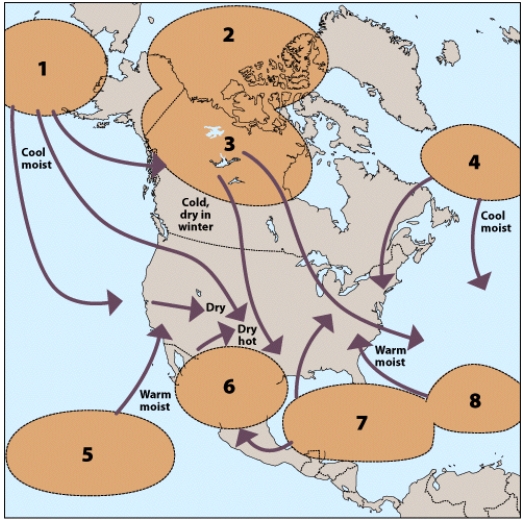
A)mP
B)mA
C)cP
D)cA

A)mP
B)mA
C)cP
D)cA

Unlock Deck
Unlock for access to all 130 flashcards in this deck.
Unlock Deck
k this deck
48
The air mass found in the area labeled 1 would be designated: 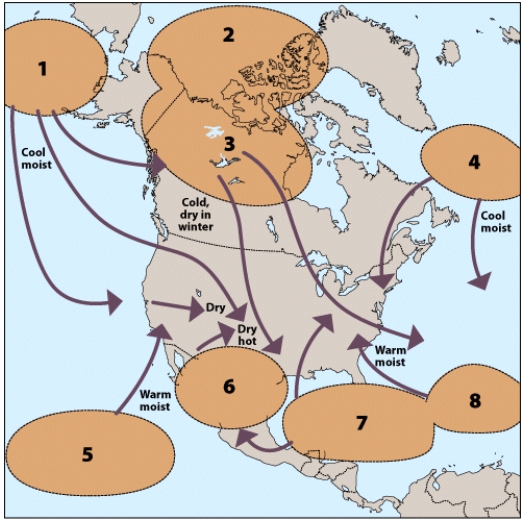
A)mP
B)mA
C)cP
D)cA

A)mP
B)mA
C)cP
D)cA

Unlock Deck
Unlock for access to all 130 flashcards in this deck.
Unlock Deck
k this deck
49
Tropical cyclones typically originate as a(n):
A)polar outbreak
B)easterly wave
C)strong equatorial low
D)none of the above
A)polar outbreak
B)easterly wave
C)strong equatorial low
D)none of the above

Unlock Deck
Unlock for access to all 130 flashcards in this deck.
Unlock Deck
k this deck
50
The air mass found in the area labeled 3 would be designated: 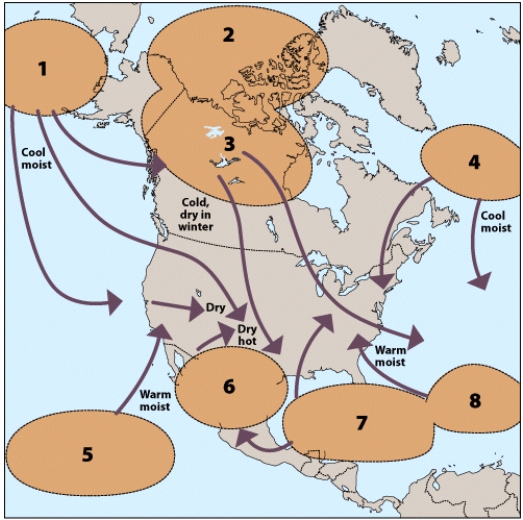
A)mP
B)mA
C)cP
D)cA

A)mP
B)mA
C)cP
D)cA

Unlock Deck
Unlock for access to all 130 flashcards in this deck.
Unlock Deck
k this deck
51
Hurricane formation in the south Atlantic and southeast Pacific is:
A)helped by warm ocean currents
B)helped by high sea surface temperatures
C)very common
D)very rare
A)helped by warm ocean currents
B)helped by high sea surface temperatures
C)very common
D)very rare

Unlock Deck
Unlock for access to all 130 flashcards in this deck.
Unlock Deck
k this deck
52
The air mass found in the area labeled 2 would be designated: 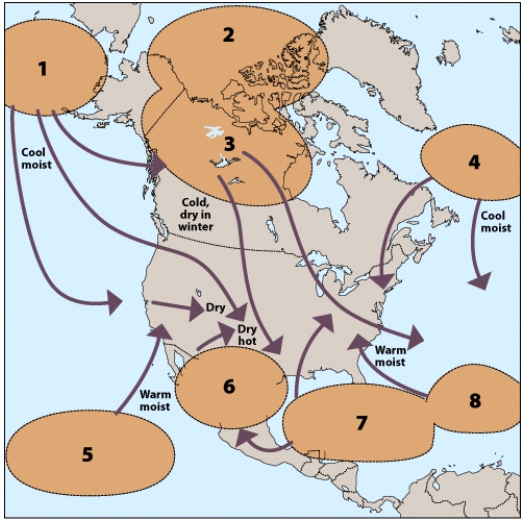
A)mP
B)mA
C)cP
D)cA

A)mP
B)mA
C)cP
D)cA

Unlock Deck
Unlock for access to all 130 flashcards in this deck.
Unlock Deck
k this deck
53
The air mass found in the area labeled 5 would be designated: 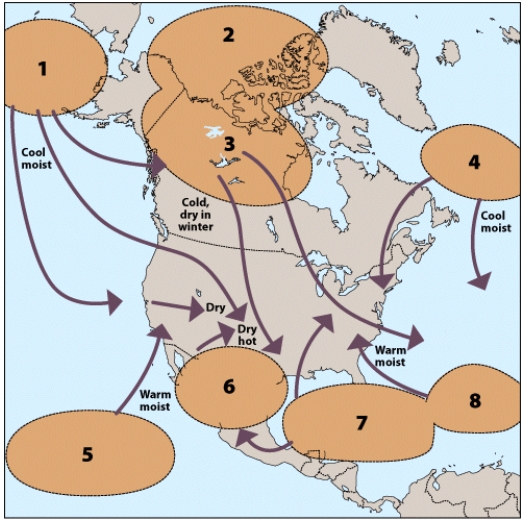
A)mT
B)mE
C)cT
D)cE

A)mT
B)mE
C)cT
D)cE

Unlock Deck
Unlock for access to all 130 flashcards in this deck.
Unlock Deck
k this deck
54
The energy that powers a tropical cyclone comes from:
A)latent heat released by condensation
B)sensible heat from the water surface
C)adiabatic warming
D)none of the above
A)latent heat released by condensation
B)sensible heat from the water surface
C)adiabatic warming
D)none of the above

Unlock Deck
Unlock for access to all 130 flashcards in this deck.
Unlock Deck
k this deck
55
A tool that is commonly used to track tropical cyclones is:
A)aerial photography
B)satellite imagery
C)radar
D)sonar
A)aerial photography
B)satellite imagery
C)radar
D)sonar

Unlock Deck
Unlock for access to all 130 flashcards in this deck.
Unlock Deck
k this deck
56
Themost powerful and destructive type of cyclonic storm that produces heavy rainfall is the:
A)wave cyclone
B)tornado
C)tropical cyclone
D)none of the above
A)wave cyclone
B)tornado
C)tropical cyclone
D)none of the above

Unlock Deck
Unlock for access to all 130 flashcards in this deck.
Unlock Deck
k this deck
57
Which of the following can be produced from thunderstorms?
A)lightning
B)hail
C)updrafts
D)all of the above
A)lightning
B)hail
C)updrafts
D)all of the above

Unlock Deck
Unlock for access to all 130 flashcards in this deck.
Unlock Deck
k this deck
58
In the North Atlantic, the peak of hurricane season occurs during:
A)late spring to early summer
B)midsummer
C)late summer to early autumn
D)late autumn
A)late spring to early summer
B)midsummer
C)late summer to early autumn
D)late autumn

Unlock Deck
Unlock for access to all 130 flashcards in this deck.
Unlock Deck
k this deck
59
The center of a tropical cyclone is known as the:
A)funnel
B)eye
C)vortex
D)core
A)funnel
B)eye
C)vortex
D)core

Unlock Deck
Unlock for access to all 130 flashcards in this deck.
Unlock Deck
k this deck
60
The city of New Orleans was badly damaged in 2005 as a result of hurricane:
A)Hugo
B)Andrew
C)Katrina
D)Rita
A)Hugo
B)Andrew
C)Katrina
D)Rita

Unlock Deck
Unlock for access to all 130 flashcards in this deck.
Unlock Deck
k this deck
61
An air mass that formed over the Gulf of Mexico would be classified as a maritime tropical air mass.

Unlock Deck
Unlock for access to all 130 flashcards in this deck.
Unlock Deck
k this deck
62
The air mass found in the area labeled 8 would be designated: 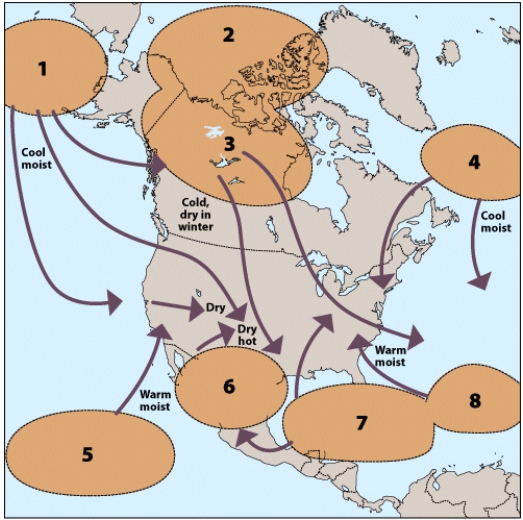
A)mT
B)mE
C)cT
D)cE

A)mT
B)mE
C)cT
D)cE

Unlock Deck
Unlock for access to all 130 flashcards in this deck.
Unlock Deck
k this deck
63
This figure shows the distribution of _______ occurrence in the United States. 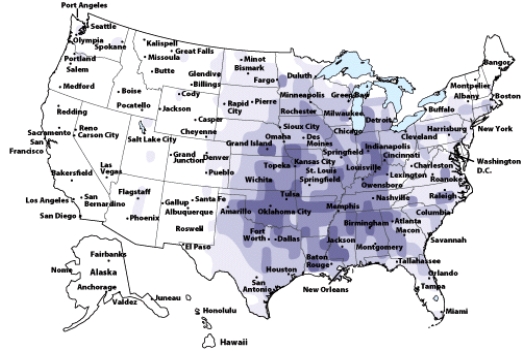
A)thunderstorm
B)tornado
C)wave cyclone
D)hurricane

A)thunderstorm
B)tornado
C)wave cyclone
D)hurricane

Unlock Deck
Unlock for access to all 130 flashcards in this deck.
Unlock Deck
k this deck
64
The figure labeled C shows the _______ of wave cyclone development. 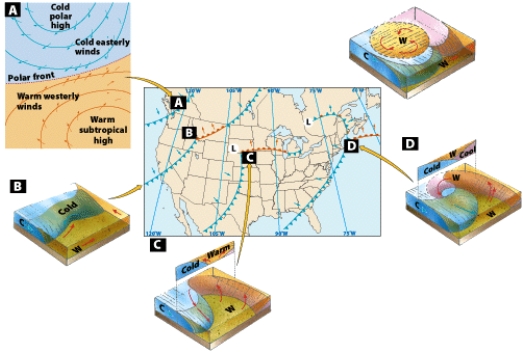
A)initial conditions
B)early stage
C)occluded stage
D)open stage

A)initial conditions
B)early stage
C)occluded stage
D)open stage

Unlock Deck
Unlock for access to all 130 flashcards in this deck.
Unlock Deck
k this deck
65
An air mass formed over north-central Canada would be classified as a continental polar air mass.

Unlock Deck
Unlock for access to all 130 flashcards in this deck.
Unlock Deck
k this deck
66
An air mass is an extensive body of air in which temperature and moisture characteristics are fairly uniform over a large area.

Unlock Deck
Unlock for access to all 130 flashcards in this deck.
Unlock Deck
k this deck
67
This figure shows a cross section of a(n): 
A)open stage wave cyclone
B)early stage wave cyclone
C)occluded stage wave cyclone
D)dissolving stage wave cyclone

A)open stage wave cyclone
B)early stage wave cyclone
C)occluded stage wave cyclone
D)dissolving stage wave cyclone

Unlock Deck
Unlock for access to all 130 flashcards in this deck.
Unlock Deck
k this deck
68
The air mass found in the area labeled 7 would be designated: 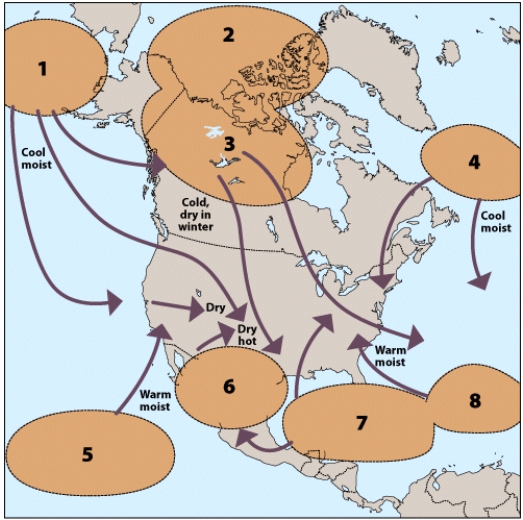
A)mT
B)mE
C)cT
D)cE

A)mT
B)mE
C)cT
D)cE

Unlock Deck
Unlock for access to all 130 flashcards in this deck.
Unlock Deck
k this deck
69
This figure shows a(n): 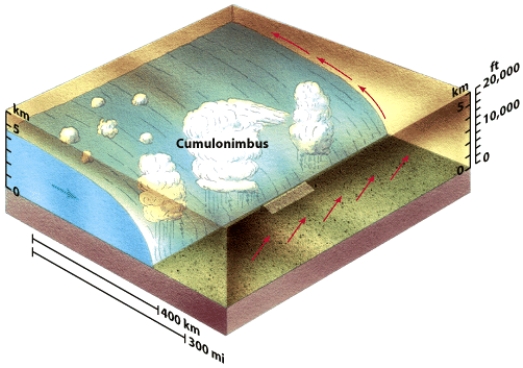
A)occluded front
B)stationary front
C)warm front
D)cold front

A)occluded front
B)stationary front
C)warm front
D)cold front

Unlock Deck
Unlock for access to all 130 flashcards in this deck.
Unlock Deck
k this deck
70
Air masses that form over oceans are classified as "humid" air masses.

Unlock Deck
Unlock for access to all 130 flashcards in this deck.
Unlock Deck
k this deck
71
The warm front in this figure is labeled: 
A)1
B)2
C)3
D)4

A)1
B)2
C)3
D)4

Unlock Deck
Unlock for access to all 130 flashcards in this deck.
Unlock Deck
k this deck
72
The figure labeled A shows the _______ of wave cyclone development. 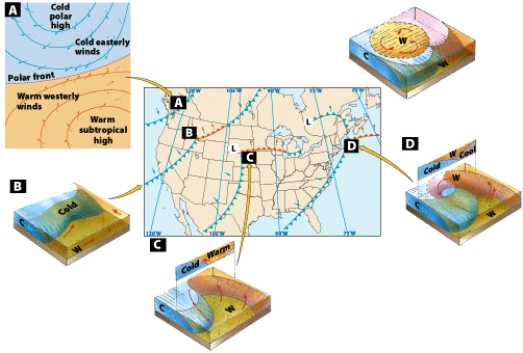
A)initial conditions
B)early stage
C)occluded stage
D)open stage

A)initial conditions
B)early stage
C)occluded stage
D)open stage

Unlock Deck
Unlock for access to all 130 flashcards in this deck.
Unlock Deck
k this deck
73
The air mass found in the area labeled 6 would be designated: 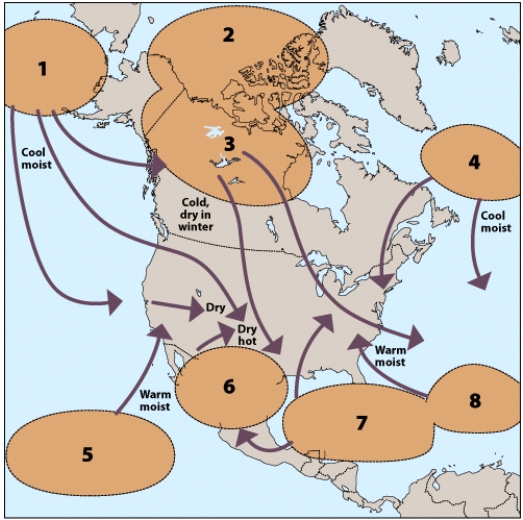
A)mT
B)mE
C)cT
D)cE

A)mT
B)mE
C)cT
D)cE

Unlock Deck
Unlock for access to all 130 flashcards in this deck.
Unlock Deck
k this deck
74
This figure shows a(n): 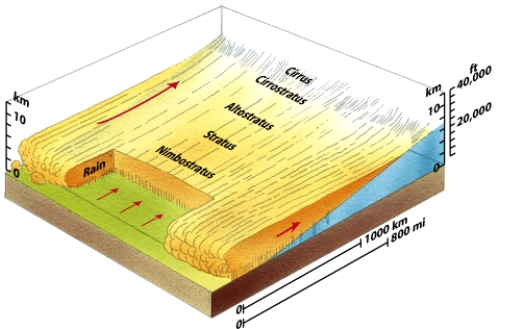
A)occluded front
B)stationary front
C)warm front
D)cold front

A)occluded front
B)stationary front
C)warm front
D)cold front

Unlock Deck
Unlock for access to all 130 flashcards in this deck.
Unlock Deck
k this deck
75
The figure labeled D shows the _______ of wave cyclone development. 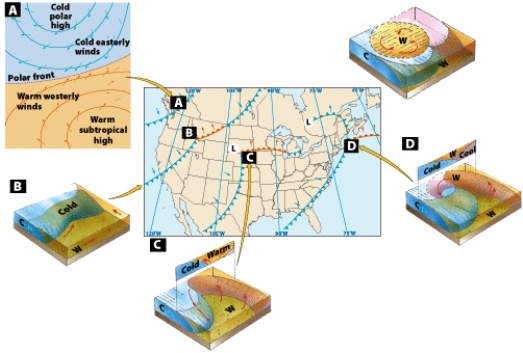
A)dissolving stage
B)early stage
C)occluded stage
D)open stage

A)dissolving stage
B)early stage
C)occluded stage
D)open stage

Unlock Deck
Unlock for access to all 130 flashcards in this deck.
Unlock Deck
k this deck
76
An air mass that formed over the Gulf of Mexico would be classified as a maritime equatorial air mass.

Unlock Deck
Unlock for access to all 130 flashcards in this deck.
Unlock Deck
k this deck
77
This figure shows a cross section of a(n): 
A)wave cyclone
B)hurricane
C)tropical cyclone
D)monsoon

A)wave cyclone
B)hurricane
C)tropical cyclone
D)monsoon

Unlock Deck
Unlock for access to all 130 flashcards in this deck.
Unlock Deck
k this deck
78
The cold front in this figure is labeled: 
A)1
B)2
C)3
D)4

A)1
B)2
C)3
D)4

Unlock Deck
Unlock for access to all 130 flashcards in this deck.
Unlock Deck
k this deck
79
The figure labeled B shows the _______ of wave cyclone development. 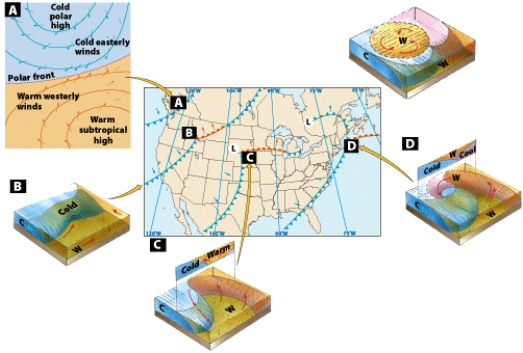
A)initial conditions
B)early stage
C)occluded stage
D)open stage

A)initial conditions
B)early stage
C)occluded stage
D)open stage

Unlock Deck
Unlock for access to all 130 flashcards in this deck.
Unlock Deck
k this deck
80
An air mass is a spiraling flow of air that blows inward towards a central area of low pressure.

Unlock Deck
Unlock for access to all 130 flashcards in this deck.
Unlock Deck
k this deck


